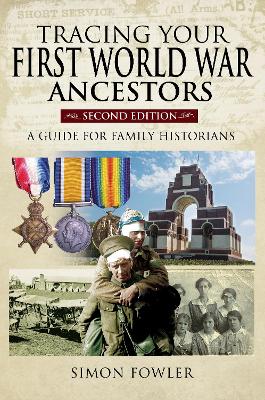Reviewed by annieb123 on
Tracing Your First World War Ancestors is a well written and accessible guide for family historians with emphasis on the First World War and with a focus on the British Isles and its dominions and colonies. Due out 30th April 2021 from Pen & Sword, it's 152 pages and will be available in paperback formats.
This book, by Dr. Simon Fowler, is one of a series of support materials published by Pen & Sword aimed at laymen genealogists researching their family background. The chapters are arranged logically and finding the relevant chapter the reader is seeking is straightforward. The themes cover a wide variety of topics and include winnowing sources and just getting started, accessing (and understanding) army service records, additional resources, casualty lists, marine battles, aviation records, womens/civilians/home service, and service outside of Britain.
There are a wealth of links and resources for further research including addresses and websites to consult in the hunt for information. The author has also included an interesting short essay on tourism to martial destinations. He provides a number of links to companies who arrange tours to battle destinations as well as websites with holiday tourism snaps and blog entries (more engaging than it may appear - I spent quite a while reading Phil Curme's online musings - linked in Dr. Fowler's appendix).
This is a very well done and practical treatise on how to get started doing family research on military service members and how to carry on; which resources are likely to reward the effort and how to make use of uncovered information.
This would make a superlative selection for library acquisition, home use, or as a gift to a history interested friend or relative. Four stars.
Disclosure: I received an ARC at no cost from the author/publisher for review purposes.
Reading updates
- Started reading
- 24 April, 2021: Finished reading
- 24 April, 2021: Reviewed
